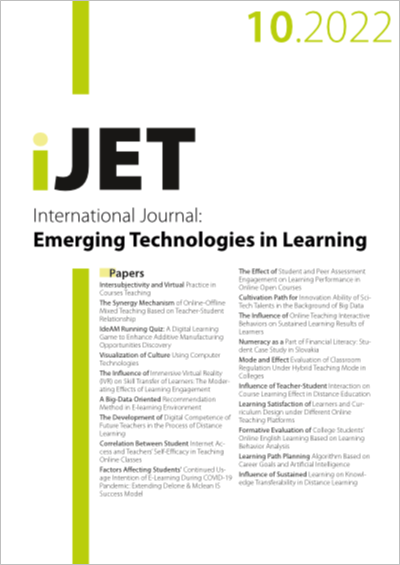Correlation Between Student Internet Access and Teachers’ Self-Efficacy in Teaching Online Classes
DOI:
https://doi.org/10.3991/ijet.v17i10.25819Keywords:
online class, signal quality, student internet access, teacher education, teachers’ self-efficacyAbstract
The most critical requirement of an online class is the availability of the internet for a teacher and students alike. The objective of this study was to find out how student internet access correlates to teachers’ self-efficacy in teaching an online class. This quantitative study used categorical data obtained using two questionnaires, one of which was student internet access consisting of three constructs, and the other is teachers’ self-efficacy in teaching an online class. The questionnaires were distributed online to in-service teachers who had completed or almost completed an online teacher professional development program in four major universities in Indonesia. As many as 158 teachers completed both questionnaires. The data were analyzed using Spearman Correlation Coefficient to reject the null hypothesis at the significance level of 0.05. The correlation was calculated for seven teacher categories, i.e. teachers in urban areas, teachers in rural areas, elementary school teachers, junior high school teachers, senior high school teachers, experienced teachers, and inexperienced teachers. The research results show that teacher-reported student internet access correlates with teachers’ self-efficacy in teaching an online class. The level of correlation ranges from weak to strong correlations, with moderate correlations for most teacher categories. The implication of this study for teacher education is also discussed.
Downloads
Published
2022-05-24
How to Cite
Mustafa, F., Weda, S., & Masykar, T. (2022). Correlation Between Student Internet Access and Teachers’ Self-Efficacy in Teaching Online Classes. International Journal of Emerging Technologies in Learning (iJET), 17(10), pp. 99–119. https://doi.org/10.3991/ijet.v17i10.25819
Issue
Section
Papers
License
Copyright (c) 2022 Faisal Mustafa, Sukardi Weda, Tanzir Masykar

This work is licensed under a Creative Commons Attribution 4.0 International License.


